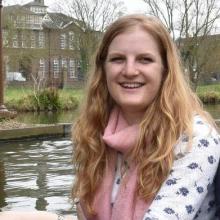Annabel Butcher is a PhD Student in Tissue Engineering
 How did you get in to engineering?
How did you get in to engineering?
I spent most of my teenage years determined not to become an engineer as I considered my Dad’s job to be boring. If engineering is sitting at a desk all day, that’s not what I wanted. Even when selecting my A-levels, I was still pretty sure I wanted a job in sports. However, I was lucky enough to have Physics, Chemistry and Design Technology teachers who had all done engineering degrees, and I started to think there may be more possibilities within engineering than I knew. It occurred to me someone has to design all the equipment used in sport, and importantly, test them too. I became fascinated by parasport, and the way the human body can interact with artificial technology. I took part in the Engineering Education Scheme at school and also attended a Headstart residential course, both organised by the EDT, confirming engineering was for me.
What are you doing now and what are you plans for the future?
I studied General Engineering at Cambridge and discovered my interest in biomaterials engineering. I enjoyed the project work most, so chose to continue my master’s project for a PhD. I am now designing, making and testing artificial materials for soft tissue engineering, with the hope of helping patients suffering from osteoarthritis. With my PhD almost over, I’m aware I have many options for a future career. I am currently enjoying this freedom of choice!
What motivates you?
I want to have an impact, to improve someone’s quality of life. I find it incredibly motivating knowing that materials or technology I design now or in the future could enable someone to walk pain-free, or even to run again. While I know my current research is not advanced enough, it is comforting that it could influence someone else’s successful work.
What has helped your career?
A lot of my confidence stems from my school. I strongly believe attending a girl’s school meant we grew up with no unconscious bias, in the students or the teachers, allowing physics and maths to be popular A-level choices. Now I’m a member of Girton College, which has a proud and inspiring history encouraging women’s education, and although women are significantly outnumbered in engineering, I found bioengineering to be one of the few areas where the gender ratio is approximately 50:50. I am lucky to know many supportive and inspiring female engineers, from all levels of my education.
How have you overcome challenges and knockbacks in your career?
I have experienced multiple occasions where a colleague has acted presumptuously towards me. Mostly in practical situations, for example assuming I can’t use equipment in the workshop, being designated the simplest task in group work or asking me to write minutes in a technical meeting. Often, I don’t notice these slights till I think back on them. I am now more aware and try to remain helpful, while making sure others are aware of my competencies.
How have you managed to balance family life and other interests with your career?
This has yet to be a major challenge for me. I have enough flexibility within my PhD to be able to commit to various sporting interests, especially the love for rowing I’ve developed while at Cambridge. I’ve also been able to structure my work to allow for time off to visit family.
Do you have any advice for women who are considering pursuing a career in Engineering?
Well done for choosing engineering! The variety of careers within engineering should make it an attractive subject across all of society, and we need to keep working to ensure engineering continues to increase its diversity.

